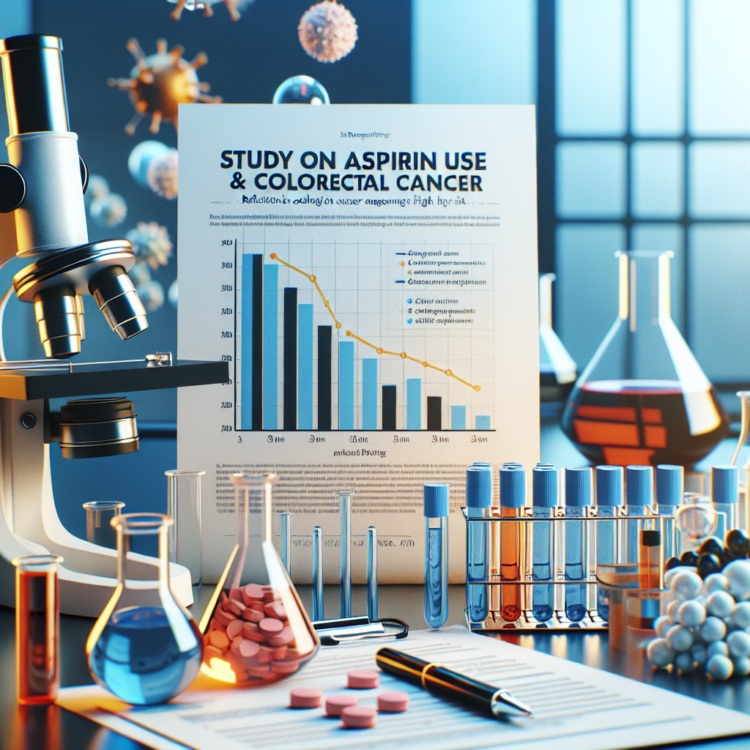Regular aspirin may help lower risk of colorectal cancer in people with greater lifestyle-related risk factors for the disease, according to a study led by researchers at Mass General Brigham. The study, published in JAMA Oncology, could encourage a more nuanced approach to preventive aspirin use.
Regular aspirin may help lower risk of colorectal cancer in people with greater lifestyle-related risk factors for the disease, according to a study led by researchers at Mass General Brigham. The study, published in JAMA Oncology, could encourage a more nuanced approach to preventive aspirin use.
“We sought to identify individuals who are more likely to benefit from aspirin to facilitate more personalized prevention strategies,” said co-senior author Andrew Chan, MD, MPH, Director of Epidemiology for the Mass General Cancer Center and gastroenterology Director of the Center for Young Adult Colorectal Cancer at Massachusetts General Hospital (MGH). Colorectal cancer is the second-leading cause of cancer death in the United States, according to the National Cancer Institute.
The U.S. Preventive Services Task Force previously recommended daily low-dose aspirin to prevent cardiovascular events and colorectal cancer in all adults ages 50 to 59 (the highest risk age group for colorectal cancer). In 2016, they withdrew the recommendation in part due to concerns about aspirin increasing the risk of gastrointestinal bleeding.
For the study, researchers analyzed the health data from 107,655 participants from the Nurses’ Health Study and Health Professionals Follow-Up Study. They compared the colorectal cancer rates in those who took aspirin regularly with those who did not take aspirin regularly. Regular aspirin use was defined as either two or more standard dose (325 mg) tablets per week or daily low-dose (81 mg) aspirin.
Study participants were followed starting from an average age of 49.4 years. Those who regularly took aspirin had a colorectal cancer 10-year cumulative incidence of 1.98 percent, compared to 2.95 percent among those who did not take aspirin.
The benefit of aspirin was largest among those with the unhealthiest lifestyles. Those with the lowest healthy lifestyle scores (unhealthiest) had a 3.4 percent chance of getting colorectal cancer if they did not take regular aspirin and a 2.12 percent chance of getting colorectal cancer if they took aspirin regularly. By contrast, in those with the highest healthy lifestyle scores (healthiest), the colorectal cancer rates were 1.5 percent in regular aspirin-taking group and 1.6% in the non-regular aspirin group. This means that in the least healthy group, treating 78 patients with aspirin would prevent one case of colorectal cancer over a 10-year period, while it would take treating 909 patients to prevent one case for the healthiest group. Lifestyle scores were calculated based on body mass index, frequency of cigarette and alcohol use, physical activity, and adherence to a high-quality diet.
“Our results show that aspirin can proportionally lower the markedly elevated risk in those with multiple risk factors for colorectal cancer,” said Daniel Sikavi, MD, lead author of the paper and a gastroenterologist at MGH. “In contrast, those with a healthier lifestyle have a lower baseline risk of colorectal cancer, and, therefore, their benefit from aspirin was still evident, albeit less pronounced.”
One outcome of the study could be that “healthcare providers might more strongly consider recommending aspirin to patients who have less healthy lifestyles,” said co-senior author Long H. Nguyen, MD, MS, a physician investigator in the Clinical and Translational Epidemiology Unit and Division of Gastroenterology at MGH and a Chen Institute Department of Medicine Transformative Scholar at MGH.
While the study included those who took regular standard-dose (325-mg) aspirin two times a week in the regular-aspirin using category, Sikavi noted that “based on prior studies, the best evidence supports daily low-dose (81-mg) aspirin for prevention.”
Previous studies have found evidence to suggest aspirin can reduce the production of pro-inflammatory proteins, known as prostaglandins, that can promote the development of cancer. Aspirin may also block signaling pathways that cause cells to grow out of control, influence the immune response against cancer cells, and block the development of blood vessels that supply nutrients to cancer cells. “Aspirin likely prevents colorectal cancer through multiple mechanisms,” Chan said.
The study did not assess potential side effects of daily aspirin use, such as bleeding. In addition, while the study tried to control for a wide range of risk factors for colorectal cancer, in comparing non-aspirin and aspirin-taking groups with the same level of risk factors, because this was an observational study, it is possible there may have been additional factors that influenced the findings.
Authorship: In addition to Sikavi, Chan, and Nguyen, Mass General Brigham authors include Wenjie Ma (MGH), David A. Drew (MGH), Shuji Ogino (BWH), Edward L. Giovannucci (BWH), and Mingyang Song (MGH). Additional authors include Kai Wang and Yin Cao.
Paper cited: Sikavi, D et al. “Aspirin Use and Incidence of Colorectal Cancer According to Lifestyle Risk” JAMA Oncology DOI: 10.1001/jamaoncol.2024.2503
###
About Mass General Brigham
Mass General Brigham is an integrated academic health care system, uniting great minds to solve the hardest problems in medicine for our communities and the world. Mass General Brigham connects a full continuum of care across a system of academic medical centers, community and specialty hospitals, a health insurance plan, physician networks, community health centers, home care, and long-term care services. Mass General Brigham is a nonprofit organization committed to patient care, research, teaching, and service to the community. In addition, Mass General Brigham is one of the nation’s leading biomedical research organizations with several Harvard Medical School teaching hospitals. For more information, please visit massgeneralbrigham.org.
Journal
JAMA Oncology
Method of Research
Observational study
Subject of Research
People
Article Title
Aspirin Use and Incidence of Colorectal Cancer According to Lifestyle Risk
Article Publication Date
1-Aug-2024
COI Statement
Chan reported receiving personal fees from Boehringer Ingelheim, Pfizer Inc, and Freenome outside the submitted work.




